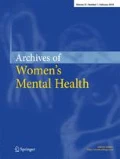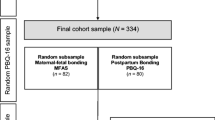Abstract
Postnatal depression and bonding failure after childbirth are major mental health issues. We investigated 99 pregnant women on three occasions (late in pregnancy and 5 days and 1 month postnatally). Anxiety during pregnancy predicted postnatal depression and bonding failure, whereas negative attitudes towards pregnancy predicted bonding failure. The effect of negative attitudes towards pregnancy on postnatal depression was possibly mediated by bonding failure. Postnatal depression and bonding failure are correlated with different risk factors and run rather independently over the course of the puerperium. Postnatal depression may be predicted by bonding failure.

Similar content being viewed by others
References
Beck CT (1995) The effects of postpartum depression on maternal-infant interaction: a meta-analysis. Nurs Res 44(5):298–304
Beck CT (2001) Predictors of postpartum depression: an update. Nurs Res 50(5):275–285
Bjelland I, Dahl AA, Haug TT, Neckelmann D (2002) The validity of the Hospital Anxiety and Depression Scale. An updated literature review. J Psychosom Res 52(2):69–77
Brockington IF (2004) Diagnosis and management of post-partum disorders: a review. World Psychiat 3(2):89–95
Cox JL, Holden JM, Sagovsky R (1987) Detection of postnatal depression. Development of the 10-item Edinburgh Postnatal Depression Scale. Br J Psychiatry 150:782–786
Kitamura T (1993) The Hospital Anxiety and Depression Scale. Arch Psychiatr Diagn Clin Eval 4(3):371–372 (in Japanese)
Kitamura T, Yoshida K, Okano T, Kinoshita K, Hayashi M, Toyoda N et al (2006) Multicentre prospective study of perinatal depression in Japan: incidence and correlates of antenatal and postnatal depression. Arch Womens Ment Health 9(3):121–130
Kumar RC (1997) “Anybody’s child”: severe disorders of mother-to-infant bonding. Br J Psychiatry 171:175–181
Matsudaira T, Igarashi H, Kikuchi H, Kano R, Mitoma H, Ohuchi K, Kitamura T (2009) Factor structure of the Hospital Anxiety and Depression Scale in Japanese psychiatric outpatient and student populations. Health Qual Life Outcomes 7:42
Moehler E, Brunner R, Wiebel A, Reck C, Resch F (2006) Maternal depressive symptoms in the postnatal period are associated with long-term impairment of mother-child bonding. Arch Womens Ment Health 9(5):273–278
Nagata M, Nagai Y, Sobajima H, Ando T, Nishide Y, Honjo S (2000) Maternity blues and attachment to children in mothers of full-term normal infants. Acta Psychiatr Scand 101(3):209–217
O’Hara MW, Swain AM (1996) Rates and risks of postpartum depression: a meta-analysis. Int Rev Psychiat 8(1):37–54
Okano T, Nomura J, Makita I, Makita A, Yamaguchi T (1989) Clinicoendocrine study of maternity blues. Clin Psychiat 31(1):725–733 (in Japanese)
Okano T, Masuji F, Tamaki R, Nomura J, Murata M, Miyaoka H, Kitamura T (1996) Validation and reliability of Japanese version of the Edinburgh Postnatal Depression Scale (EPDS). Arch Psychiat Diag Clin Eval 7(4):525–533 (in Japanese)
Robson KS, Moss HA (1970) Patterns and determinants of maternal attachment. J Pediatr 77(6):976–985
Schermelleh-Engel K, Moosbrugger H, Müller H (2003) Evaluating the fit of structural equation models: tests of significance and descriptive goodness-of-fit measures. Methods Psychol Res Online 8(2):23–74
Stein G (1980) The pattern of mental change and body weight change in the first post-partum week. J Psychosom Res 24(3–4):165–171
Taylor A, Atkins R, Kumar R, Adams D, Glover V (2005) A new Mother-to-Infant Bonding Scale: links with early maternal mood. Arch Womens Ment Health 8(1):45–51
Wittkowski A, Wieck A, Mann S (2007) An evaluation of two bonding questionnaires: a comparison of the Mother-to-Infant Bonding Scale with the Postpartum Bonding Questionnaire in a sample of primiparous mothers. Arch Womens Ment Health 10(4):171–175
Yamashita H, Yoshida K (2004) Investigation of community-based preventive intervention using questionnaires for mothers at risk for child abuse: contribution of perinatal psychiatry to child abuse in infancy. Jap J Child Abuse Neglect 6(2):218–231 (in Japanese)
Zigmond AS, Snaith RP (1983) The Hospital Anxiety and Depression Scale. Acta Psychiatr Scand 67(6):361–370
Acknowledgments
This study was partly supported by a Grant-in-Aid for Scientific Research (C) of the Ministry of Education, Culture, Sports, Science and Technology of Japan (14570917). We thank Dr. H. Nishiguchi and his staff for their assistance (Mie Prefectural Government); and Dr. Y. Atsuta (Atsuta Pediatrics Clinic), Dr. M. Kihira (Saint Rose Obstetrics and Gynecology Clinic), Dr. N. Kihira (Tsu Nishi Obstetrics and Gynecology Clinic), Dr. H. Nomura (Nomura Obstetrics and Gynecology Clinic), and Dr. S. Yanase (Yanase Clinic Obstetrics and Gynecology) for their support. We also thank all the women who participated in the study.
Conflict of interest
The authors declare no conflict of interest related to the manuscript.
Author information
Authors and Affiliations
Corresponding author
Rights and permissions
About this article
Cite this article
Kokubu, M., Okano, T. & Sugiyama, T. Postnatal depression, maternal bonding failure, and negative attitudes towards pregnancy: a longitudinal study of pregnant women in Japan. Arch Womens Ment Health 15, 211–216 (2012). https://doi.org/10.1007/s00737-012-0279-x
Received:
Accepted:
Published:
Issue Date:
DOI: https://doi.org/10.1007/s00737-012-0279-x




